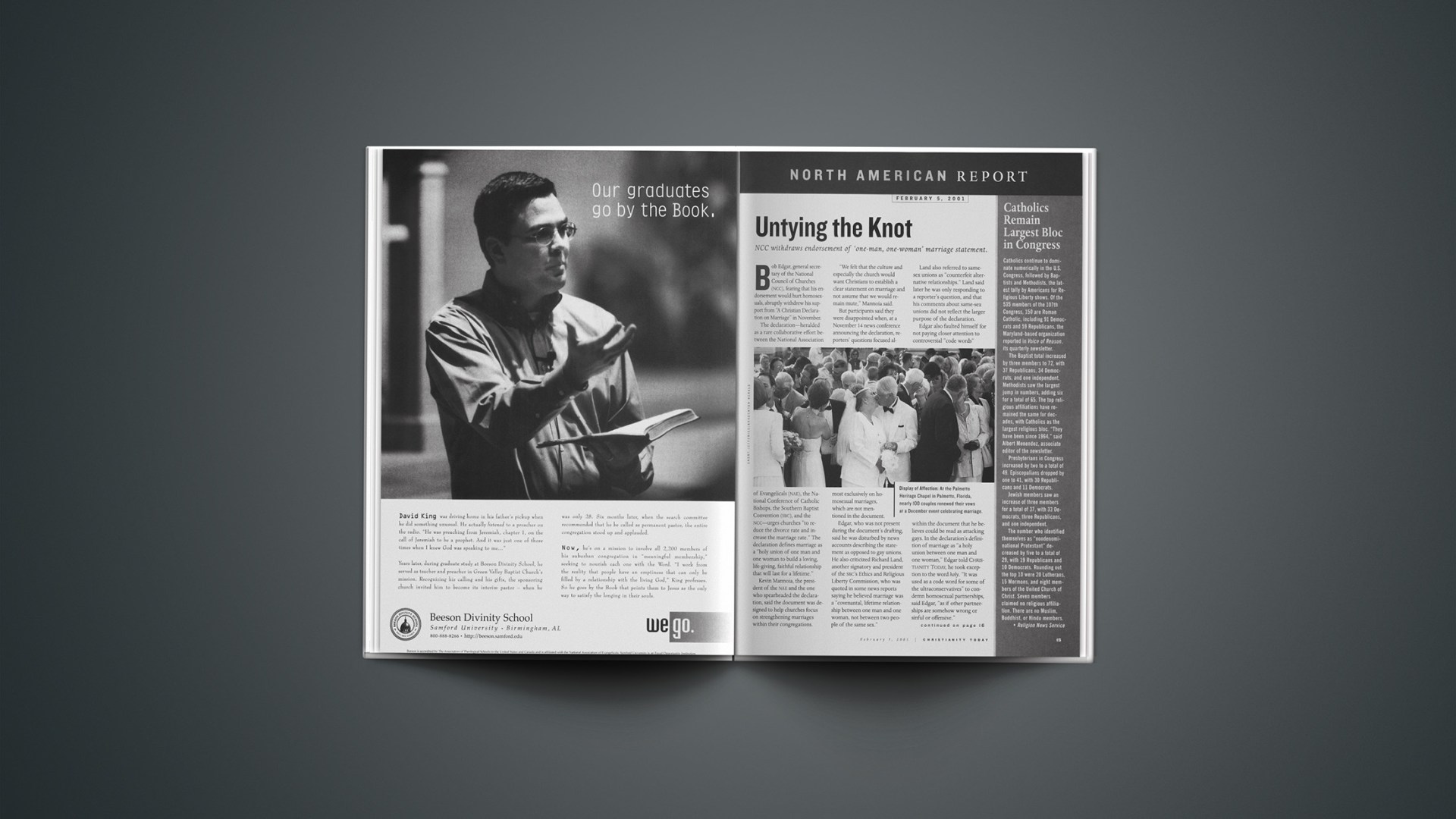The declaration—heralded as a rare collaborative effort between the National Association of Evangelicals (NAE), the National Conference of Catholic Bishops, the Southern Baptist Convention (SBC), and the NCC—urges churches “to reduce the divorce rate and increase the marriage rate.” The declaration defines marriage as a “holy union of one man and one woman to build a loving, life-giving, faithful relationship that will last for a lifetime.”
Kevin Mannoia, the president of the NAE and the one who spearheaded the declaration, said the document was designed to help churches focus on strengthening marriages within their congregations.
“We felt that the culture and especially the church would want Christians to establish a clear statement on marriage and not assume that we would remain mute,” Mannoia said.
But participants said they were disappointed when, at a November 14 news conference announcing the declaration, reporters’ questions focused almost exclusively on homosexual marriages, which are not mentioned in the document.
Edgar, who was not present during the document’s drafting, said he was disturbed by news accounts describing the statement as opposed to gay unions. He also criticized Richard Land, another signatory and president of the SBC’s Ethics and Religious Liberty Commission, who was quoted in some news reports saying he believed marriage was a “covenantal, lifetime relationship between one man and one woman, not between two people of the same sex.”
Land also referred to same-sex unions as “counterfeit alternative relationships.” Land said later he was only responding to a reporter’s question, and that his comments about same-sex unions did not reflect the larger purpose of the declaration.
Edgar also faulted himself for not paying closer attention to controversial “code words” within the document that he believes could be read as attacking gays. In the declaration’s definition of marriage as “a holy union between one man and one woman,” Edgar told Christianity Today, he took exception to the word holy. “It was used as a code word for some of the ultraconservatives” to condemn homosexual partnerships, said Edgar, “as if other partnerships are somehow wrong or sinful or offensive.”
Edgar, who did not attend the initial press conference because of an NCC General Assembly meeting in Atlanta, said that he soon began receiving protests concerning his endorsement.
Further pressure came during a November 16 breakfast of the NCC ‘s Lesbian, Gay, Bisexual, Transgender Caucus when a speaker said that some of the declaration’s signers opposed gay rights. After explaining that the declaration was not meant to oppose same-sex unions, Edgar sent a letter to all NCC delegates saying he did not want his support for marriage to be used as a weapon “to attack gays and lesbians.”
The next day Edgar apologized to the full General Assembly for signing the statement without adequately consulting the NCC ‘s 36 communions, and said he would remove his name.
The unwillingness of the NCC to affirm a traditional statement on marriage is testing the group’s ecumenical mission at a time when the struggling organization is urgently seeking wider support.
Edgar’s reversal sparked strong reactions, particularly from the Association for Church Renewal (ACR), composed of leaders of reform groups in mainline Protestant denominations that belong to the NCC. James M. Kushiner, an ACR member and executive director of the Fellowship of St. James, an ecumenical orthodox coalition, said, “That the NCC remains stuck in 1960s sexual radicalism only means that its demise as a viable Christian institution serving Christian unity is all the more certain.”
Critics in evangelical circles say Edgar’s action will further erode support for future ecumenical endeavors. “The NCC is saying it wants to reach out in a new dialogue to evangelicals and charismatics,” said James Heidinger, president of the conservative Good News movement within the United Methodist Church. “But I find it an interesting contradiction that they have not tried to reach out to evangelical bodies within their own denominations.”
Edgar said he expected the effect of the controversy to be negligible, predicting that unity could be built around issues such as reducing poverty and improving education and healthcare for children. But Mannoia said the NCC’s withdrawal has “raised serious questions about [its] willingness to engage with integrity on other issues.”
Mannoia also urged NCC denominations that supported the marriage declaration to sign on: “I don’t want [Edgar’s] withdrawal to imply that the rest of us are closing the door to them.”
Copyright © 2001 Christianity Today. Click for reprint information.
Related Elsewhere
Read the NAE’s”A Christian Declaration on Marriage.”The homepages of the National Association of Evangelicals (NAE) and the National Council of Churches (NCC) offer more information on the groups—and the controversy.
Read Edgar’s statement, in which he withdraws his previous support of the declaration.
Christianity Today‘s Weblog summaries of the document, Edgar’s problems with it, and his eventual withdrawal contain links to other news outlets’ coverage.










